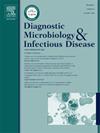曲霉PCR对侵袭性曲霉病管理的影响:COVID-19大流行期间三级保健医院的经验。
IF 2.1
4区 医学
Q3 INFECTIOUS DISEASES
Diagnostic microbiology and infectious disease
Pub Date : 2024-12-15
DOI:10.1016/j.diagmicrobio.2024.116658
引用次数: 0
摘要
目的:评价曲霉PCR在常规治疗中对侵袭性曲霉病(IA)的控制作用。方法:一项回顾性研究纳入了235例患者,这些患者在2020年11月至2022年4月期间对呼吸样本(支气管肺泡灌洗、非支气管镜灌洗和痰液)进行了曲霉PCR检测。结果:293例中PCR阳性的占11.9%。PCR阳性结果没有改变IA的诊断类别。抗真菌治疗的决定是基于54名接受治疗的患者中9名的PCR结果。10例PCR阳性患者因临床好转未治疗,等待结果。结论:曲霉PCR的应用受到使用未经验证的样本和报告延迟的限制,在因COVID-19而限制支气管镜检查的时期,降低了其对管理决策的影响。为了提高其临床效果和成本效益,实施适当使用的诊断算法是必不可少的。本文章由计算机程序翻译,如有差异,请以英文原文为准。
Impact of Aspergillus PCR on the management of invasive aspergillosis: A tertiary care hospital experience during the COVID-19 pandemic
Aim
To assess the impact of Aspergillus PCR on managing invasive aspergillosis (IA) in routine patient management.
Methods
A retrospective study included 235 patients who had Aspergillus PCR tests performed on respiratory samples (bronchoalveolar lavage, non-bronchoscopic lavage, and sputum) from November 2020 to April 2022.
Results
Of 293 tests, 11.9% were PCR positive. Positive PCR results did not alter IA diagnostic categories. The decision on antifungal treatment was based on PCR results in nine of the 54 treated patients. Ten patients with positive PCR were not treated due to clinical improvement while awaiting results.
Conclusion
The utility of Aspergillus PCR was constrained by the use of non-validated samples and delays in reporting, reducing its impact on management decisions during a time when bronchoscopy was limited due to COVID-19. To enhance its clinical effectiveness and cost-efficiency, implementing a diagnostic algorithm for appropriate use is essential.
求助全文
通过发布文献求助,成功后即可免费获取论文全文。
去求助
来源期刊
CiteScore
5.30
自引率
3.40%
发文量
149
审稿时长
56 days
期刊介绍:
Diagnostic Microbiology and Infectious Disease keeps you informed of the latest developments in clinical microbiology and the diagnosis and treatment of infectious diseases. Packed with rigorously peer-reviewed articles and studies in bacteriology, immunology, immunoserology, infectious diseases, mycology, parasitology, and virology, the journal examines new procedures, unusual cases, controversial issues, and important new literature. Diagnostic Microbiology and Infectious Disease distinguished independent editorial board, consisting of experts from many medical specialties, ensures you extensive and authoritative coverage.

 求助内容:
求助内容: 应助结果提醒方式:
应助结果提醒方式:


